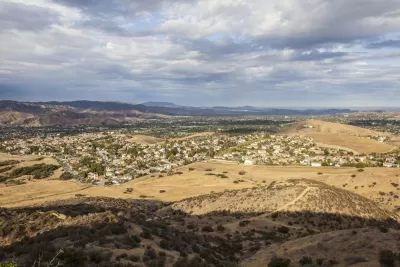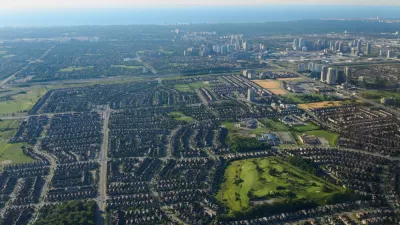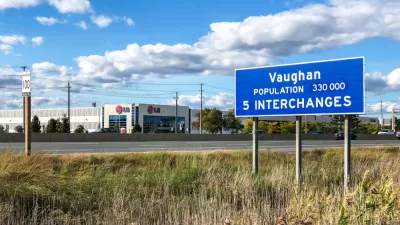Some commentators on urban containment treat the issue as all-or-nothing: either strict limits on suburban development are good public policy everywhere, or they are good public policy nowhere. Perhaps a more nuanced view is appropriate.

I recently read a blog post crediting me with recognizing the evils of urban containment—by which I mean, land use policies (such as urban growth boundaries) that limit exurban real estate development. Since I'd been writing about very different issues over the past few years, I asked myself: what is my position on urban containment, anyhow?
Fifteen years ago, I would have considered growth boundaries a pretty good thing, because my work was focused on the evils of suburban sprawl, and I had never experienced out-of-control housing prices. But as the latter problem has spread beyond New York and San Francisco, I have become a little more sensitive to the best argument against urban containment: that it limits housing supply and thus raises housing prices. So it seems to me that this issue involves a conflict between two worthy values: affordable housing and limiting the negative effects of suburbanization. If you are a doctrinaire libertarian or environmentalist, the conflict is easy to resolve: one value comes first, and the other value goes in the trash can.
But for the rest of us, it seems to me that the right level of urban containment (if any) may be different for different regions, depending on a variety of factors:
- Are the city and its older suburbs declining? If so, containment might prevent a wildfire of blight that infects suburb after suburb, making the region as a whole less desirable. From this perspective, urban containment in some form might be most desirable in stagnant Rust Belt regions with declining cities, such as Cleveland or Detroit.
- How high are housing costs? Obviously, containing housing costs is more important where housing costs are already high—for example, New York or San Francisco. On the other hand, in regions where some houses are so cheap that making them habitable is not worth the trouble, reducing housing costs is perhaps a lower priority.
- If regional housing costs are high (or at least not so low that houses are selling for the price of a video recorder) how willing is the city to change its zoning codes to accommodate new housing? If new housing doesn't go in the newer suburbs, it has to go somewhere. And if government doesn't let it go somewhere, obviously a housing shortage results.
- Is a region's physical climate temperate enough that its residents generate relatively low levels of greenhouse gases no matter where they live? For example, in a region where temperatures never go below freezing or above 90 degrees Fahrenheit, heating and cooling bills will be lower than in icy Minnesota or sweltering Houston. So it seems to me that if we are interested in limiting climate change, we should encourage settlement in these temperate regions even if it means more exurban housing in those regions. In other words, climate change is another reason why urban containment in coastal California is not a good idea.
In sum, aggressive containment policies such as growth boundaries seem least appropriate for temperate, growing, expensive regions such as coastal California. On the other hand, I am less willing to condemn such policies for small, stagnant regions.

Maui's Vacation Rental Debate Turns Ugly
Verbal attacks, misinformation campaigns and fistfights plague a high-stakes debate to convert thousands of vacation rentals into long-term housing.

Planetizen Federal Action Tracker
A weekly monitor of how Trump’s orders and actions are impacting planners and planning in America.

San Francisco Suspends Traffic Calming Amidst Record Deaths
Citing “a challenging fiscal landscape,” the city will cease the program on the heels of 42 traffic deaths, including 24 pedestrians.

Defunct Pittsburgh Power Plant to Become Residential Tower
A decommissioned steam heat plant will be redeveloped into almost 100 affordable housing units.

Trump Prompts Restructuring of Transportation Research Board in “Unprecedented Overreach”
The TRB has eliminated more than half of its committees including those focused on climate, equity, and cities.

Amtrak Rolls Out New Orleans to Alabama “Mardi Gras” Train
The new service will operate morning and evening departures between Mobile and New Orleans.
Urban Design for Planners 1: Software Tools
This six-course series explores essential urban design concepts using open source software and equips planners with the tools they need to participate fully in the urban design process.
Planning for Universal Design
Learn the tools for implementing Universal Design in planning regulations.
Heyer Gruel & Associates PA
JM Goldson LLC
Custer County Colorado
City of Camden Redevelopment Agency
City of Astoria
Transportation Research & Education Center (TREC) at Portland State University
Jefferson Parish Government
Camden Redevelopment Agency
City of Claremont






























